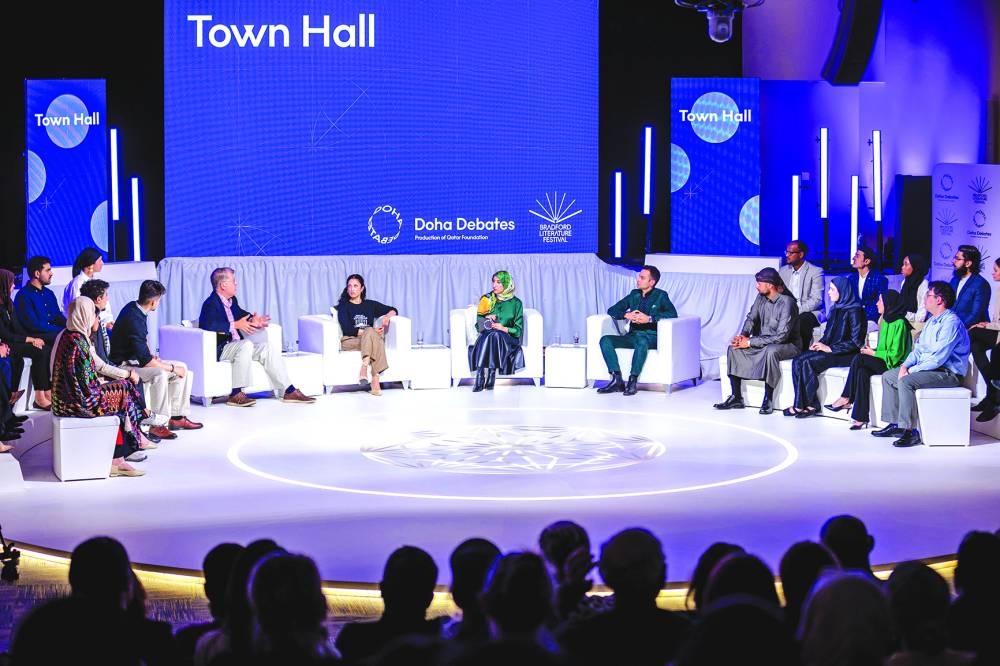Qatar Foundation (QF)'s Doha Debates on Wednesday hosted a discussion on the "Worldwide Influence and Impact of Western Narratives".
According to an official statement from QF, a diverse panel of experts and students took to the stage at the Bradford Literature Festival in the UK to explore the West’s current promotion of global justice marking the event. At the start of "Narrative power: Is the West promoting global justice?" - a recent town hall hosted by Qatar Foundation’s Doha Debates and the Bradford Literature Festival in the UK - a quote from George Orwell’s “1984” appeared on the screen behind the participants: “Who controls the past, controls the future: who controls the present, controls the past.”
The question of control—specifically, of the narrative about global justice and free speech—was the subject under discussion on July 6, as media experts, university students and recent graduates came together to discuss this timely and crucial issue.
Novelist and speaker Fatima Bhutto, journalist and blogger Steve Clemons, and author and comedian Konstantin Kisin engaged in a wide-ranging discussion about whether we can rely on Western media to promote global justice. Moderated by journalist and broadcaster Remona Aly, the event also featured students and graduates from campuses across Qatar and the UK, who expanded the conversation with their questions and perspectives.
Bhutto, whose recent book “New Kings of the World: Dispatches from Bollywood, Dizi, and K-Pop” argues that the West’s cultural influence is lessening across the world, opened with a succinct answer to the titular question: “No,” she said. “The West has only ever promoted its own interests, often at the cost of global justice.”
Bhutto pointed to recent and historical support of Israel as a chief reason for the unreliability of Western narrative: “Canada, the United States, the United Kingdom, all of Europe has given billions of dollars, weapons, diplomatic cover to Israel—always, but especially over the nine months while it has been committing genocide,” she said. “To say that the West is somehow responsible for global justice is a beautiful story. It's just not true. It is, if anything, a threat to global justice.”
Clemons, a former editor-at-large at the news platform Semafor, The Hill, and The Atlantic, and author of the political blog The Washington Note, called Bhutto’s position a “provocation” and offered his own in return: “The values and norms that Western journalism attempts to be about are quite worthy for any system around the world. ... Trying to promulgate the values of critical thinking, of trying to define what truth is, of looking at what civil rights and civil justice mean.”
However, he said, those values are currently under immense stress: “Governments spend a lot of money trying to infiltrate, trying to control their own press. ... Western values and ideals are eroding in part because of very powerful states and controls and censorship.”
Satirist and social commentator Kisin, author of “An Immigrant's Love Letter to the West,” agreed that the West’s core principles may be eroding, but insisted throughout the conversation that they should still be viewed as the exemplar in comparison to other parts of the world.
“Usain Bolt, the sprinter—is he fast or is he slow? How do you know? By comparing him to other people, right?” Kisin asked the audience. “The same is true about speech. ... Everything is understood by comparing it to others. There are six great civilizations in the world: Western Christian civilisation, Eastern Christian civilisation, the two Islamic civilisations, the Chinese civilisation, and the Indian civilisation. In which of those civilisations would you rather live than the one that you are speaking in now?”
Toward the end of the discussion, moderator Aly introduced a Majlis-style segment in which participants reflected on the conversation, raising points that expanded or shifted their thinking.
Rami Mroueh, a global diplomacy student at SOAS University of London, offered a final thought that cut across the participants’ divergent views: “It is possible to have pluralism in journalism... I'm not saying we need to cut Western narratives entirely out of the conversation. I'm just saying we need less of it, and to give more light to other news sources and other inputs from other cultures that don't get a lot of attention.”
This is the sixth town hall for Doha Debates, which launched the series in 2022 with a conversation on the future of women’s and girls’ education in Afghanistan featuring Nobel Peace Prize winner Malala Yousafzai. Other recent town halls have addressed such critical global issues as leadership in a multipolar world, Palestinian identity, and Eastern perspectives on Western Orientalist art.
Qatar
QF’s Doha Debates hosts discussion on the worldwide influence and impact of Western narratives

